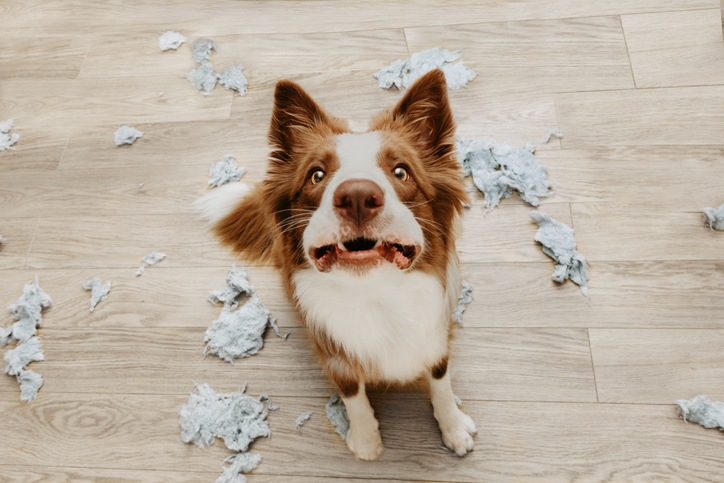How to Deal with Separation Anxiety in Dogs

Separation anxiety is a common problem among dogs and often leaves pet parents feeling helpless. It can manifest in various behavioral issues such as destructive behavior, excessive barking or howling, house soiling, and more. Separation anxiety may be caused by various factors such as past trauma, lack of socialization, changes in routine, among others. As a pet parent, it is essential to understand the symptoms of separation anxiety, its causes, and how to deal with it. This article provides insights on dealing with separation anxiety in dogs.
Understanding Separation Anxiety

Separation anxiety is a psychological disorder that occurs when a dog becomes stressed or anxious about being separated from their owner or caregiver. It can range from mild to severe, but if left untreated, it can lead to severe behavioral problems. Here are some signs of separation anxiety:
Signs of Separation Anxiety
- Excessive barking or howling
- Destructive behavior such as chewing furniture, doors, or personal items
- Pacing, restlessness, or hyperactivity
- House soiling
- Aggression towards other animals or people
- Attempting to escape
- Refusing to eat or drink
- Depression or lethargy
Causes of Separation Anxiety
Separation anxiety can be triggered by various factors such as:
- Past trauma such as abandonment or abuse
- Lack of socialization during early development stages
- Sudden changes in the routine or environment
- Genetic predisposition
- Negative reinforcement such as punishment or scolding when left alone
- Lack of physical exercise or mental stimulation
How to Diagnose Separation Anxiety
If you suspect your dog has separation anxiety, it is essential to consult with your veterinarian. The vet will perform a thorough physical exam to rule out any medical conditions that may mimic the symptoms of separation anxiety. They may also recommend a behaviorist to assess your dog’s behavior and provide a diagnosis.
Treatment Options for Separation Anxiety
There are various treatment options available to help dogs with separation anxiety. The type of treatment depends on the severity of the condition and the underlying cause. Here are some common treatment options:
Medications
In severe cases of separation anxiety, medication may be required to calm the dog. Your veterinarian may prescribe anti-anxiety medications such as Clomicalm or Prozac. However, medication should only be used under the guidance of a veterinarian and behaviorist.
Behavior Modification Techniques
Behavioral modification techniques can help reduce separation anxiety in dogs. These techniques focus on changing the dog’s behavior towards being left alone. Here are some examples:
- Gradual desensitization: This involves gradually exposing the dog to being left alone for short periods while providing positive reinforcement.
- Counter conditioning: This involves creating a positive association between being left alone and rewards such as treats or toys.
- Environmental enrichment: Providing mental stimulation such as puzzle toys or interactive games can keep the dog occupied while alone.
Training
Training can also help reduce separation anxiety in dogs. Training sessions should be positive and reward-based. Here are some training tips:
- Teach the dog basic obedience commands such as sit, stay, come, and leave it.
- Practice leaving the dog for short periods and gradually increasing the duration.
- Avoid making a big fuss when leaving or returning home.
Preventing Separation Anxiety

Prevention is always better than cure. Here are some tips to prevent separation anxiety in dogs:
Early Socialization
Early socialization is essential in preventing separation anxiety. Exposing your puppy to different people, animals, and environments can help them feel comfortable when left alone.
Establish a Routine
Establishing a routine can help your dog feel secure and reduce their stress levels. Try to feed, walk, and play with your dog at the same time every day.
Provide Mental Stimulation
Providing mental stimulation can prevent boredom and anxiety. Puzzle toys, chew toys, and interactive games can keep your dog occupied and mentally stimulated.
Video
Frequently Asked Questions
What are some home remedies for separation anxiety in dogs?
While there is no cure for separation anxiety, you can try using natural remedies such as CBD oil, essential oils, or calming supplements. However, always consult with your veterinarian before trying any home remedies.
Can a dog outgrow separation anxiety?
Some dogs may outgrow separation anxiety, especially if it’s a mild case. However, severe cases may require professional intervention.
Should I adopt another dog to help my dog with separation anxiety?
Adopting another dog is not recommended as a solution for separation anxiety. It may worsen the symptoms or cause other behavioral problems.
Can separation anxiety be prevented altogether?
While separation anxiety cannot be prevented altogether, early socialization, establishing a routine, and providing mental stimulation can reduce the risk of developing the condition.
How long does it take to treat separation anxietyThe duration of treatment for separation anxiety varies depending on the severity of the condition. Mild cases may be treated within a few weeks, while severe cases may take several months or longer. The key to successfully treating separation anxiety is consistency and patience. It’s important to work with a veterinarian and behaviorist to develop a personalized treatment plan for your dog.
In conclusion, separation anxiety in dogs can be a challenging problem to deal with, but it’s essential to understand its causes, symptoms, and treatment options. Early diagnosis and intervention can help prevent the condition from worsening and improve your dog’s overall quality of life. Remember, always consult with a veterinarian or behavioral specialist before trying any treatment or home remedy for separation anxiety in dogs.